Sharp, pungent, and punchy, bagoong (or shrimp paste) is definitely a polarizing ingredient. While some have grown to love the unique umami flavor this dish has to offer, others can’t stand the smell of it — much less the taste! Bagoong is an acquired taste, but those who love it know just how versatile it…
/5
2 Comments
Published: 6/23/23
This post may contain affiliate links. Please read our disclosure policy.
Sharp, pungent, and punchy, bagoong (or shrimp paste) is definitely a polarizing ingredient. While some have grown to love the unique umami flavor this dish has to offer, others can’t stand the smell of it — much less the taste! Bagoong is an acquired taste, but those who love it know just how versatile it can be in the kitchen. From a partner to sumptuous kare kare to the perfect dip for green mangoes, there’s so much you can do with this delightful condiment. One of the most popular dishes that involves the use of bagoong is, of course, binagoongan: delicious pork belly marinated in this delightful shrimp paste. But for those looking to up the ante, why not try this pork binagoongan out for size?
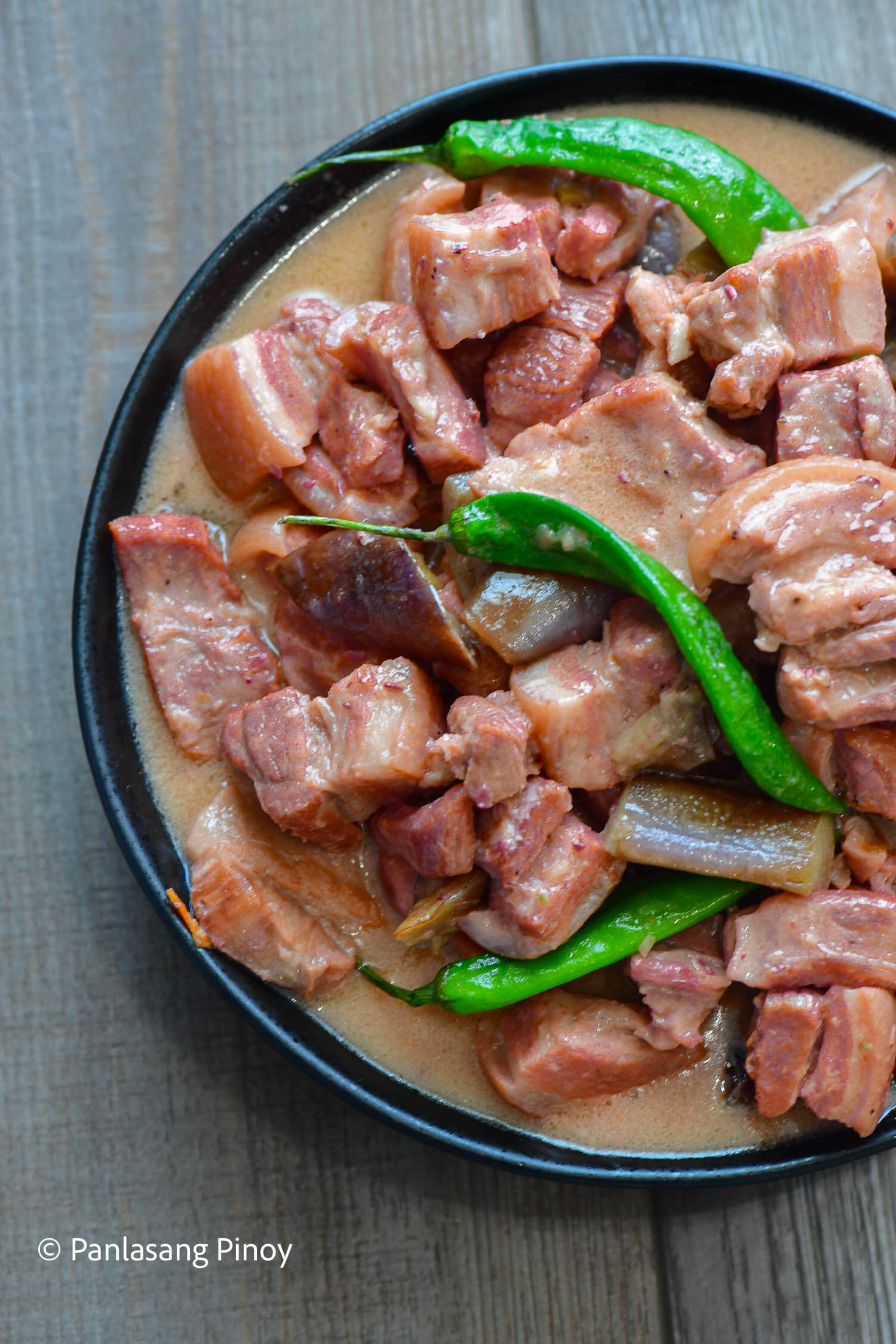
With the warm, nutty sensations of coconut milk, pork binagoongan sa gata may be the thing to convert your bagoong hater friends and family! The creaminess of your gata is able to cut through the umami seafood flavors of your shrimp paste. Combining it with other vegetables and chili peppers for spice brings you a delightful combination of richness and indulgence. You’ll never be able to view bagoong the same way again!
What is bagoong?
A shrimp or fish paste native to the Philippines, bagoong comes about through a fermentation process. This lasts a couple of weeks — and can even extend to months, depending on the intensity of flavor one is after. While it is a Filipino food through and through, other Southeast Asian countries have concocted their own renditions of this beloved condiment, as it goes so well with so many of their dishes, too. Even within the Philippines alone there are several different versions of this beloved shrimp paste!
Because Filipinos love bold flavors, it should come as no surprise that bagoong itself is a bold ingredient. As we’ve already mentioned, its pungent and strong aroma are only a teaser for the distinctly umami taste it lends each dish. It’s salty, savory, and even gives you a hint of the usual fishiness that you get from seafood. And while many have stayed away due to the impact of its aroma, those who dare try it are rewarded by how insanely delicious it is.
What makes pork binagoongan sa gata different from regular pork binagoongan?
It is the delicious addition of gata, or coconut milk, that makes this version of binagoongan stand head and shoulders above its original counterpart. What coconut milk is able to do here is balance out all the strong flavors of your dish. Put that together with your fatty cuts of pork belly, and you have a main dish so sinfully good you’ll need lots and lots of rice to back it up!
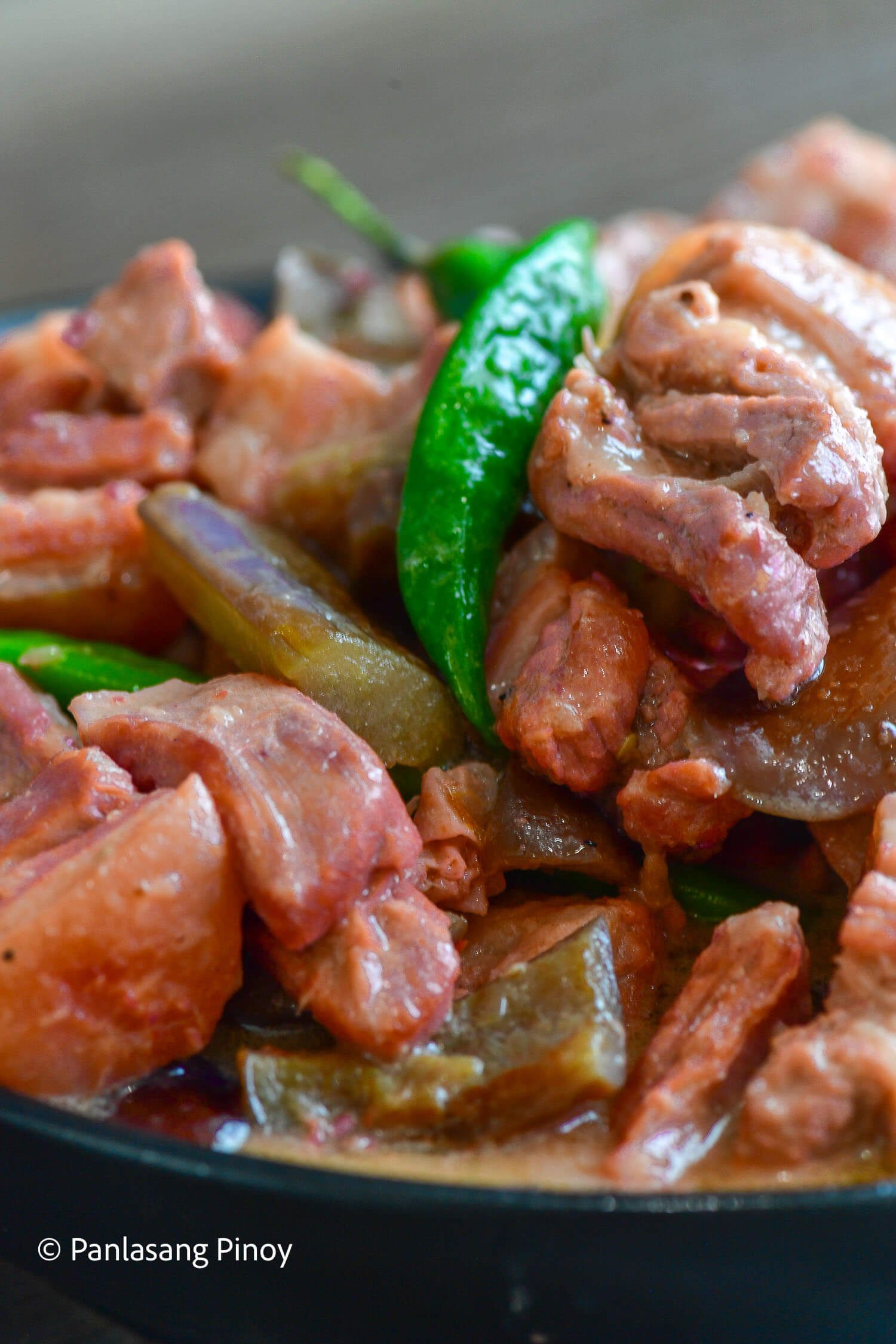
Of course, your dish wouldn’t be complete without your vegetables, either! In this case, we have the classic eggplant — a faithful partner to bagoong. This delicious vegetable is known to pair well with this flavorful condiment, and will continue to do so in this pork binagoongan sa gata. To ensure that it doesn’t end up too soggy in your dish, it’s best to pan fry your eggplants first. You add them to your pork binagoongan sa gata later on in your recipe, after they’re tender, lightly browned, and ready to be enjoyed.
Lastly, no binagoongan, with gata or without, would be complete without that element of spice! To get the perfect kick you need, I highly recommend adding these long green chili peppers. I typically use three for a spice that’s definitely present but not overwhelming. But if you have a different spice preference, you can do more or less, depending on how you like it!
With the combination of creaminess, spiciness, and overwhelming umami, your pork binagoongan sa gata brims with delectable flavor. And the best part is? It’s just so easy to make!
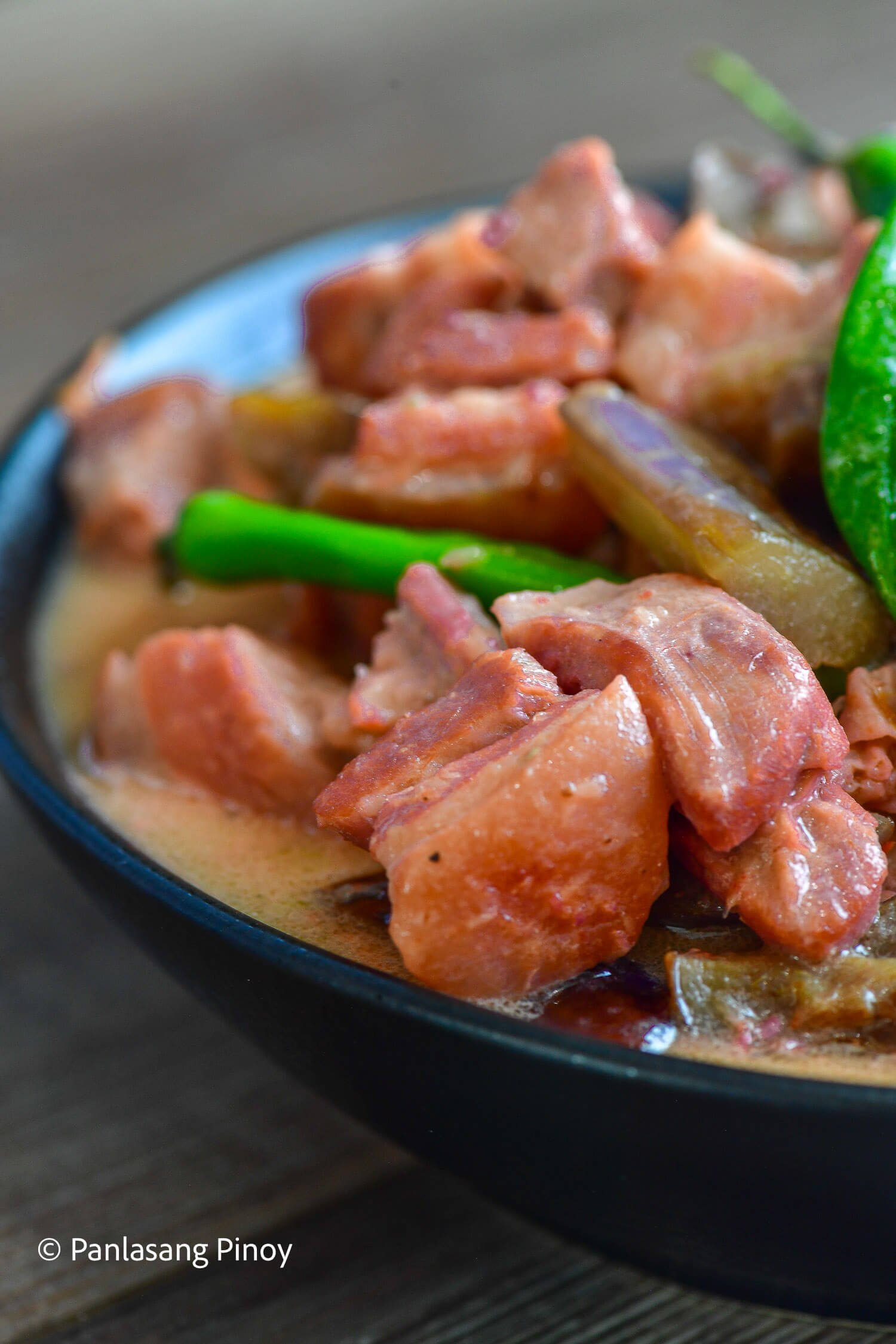
Recommended dishes that makes use of bagoong
Pork binagoongan sa gata is only one example of a dish that utilizes this tasty condiment best! For other recipe ideas, you can look to the following:
How to make pork binagoongan sa gata
Prepare your pork belly and eggplant
Your cooking pan will be used for two things, first and foremost. The first will be for your pork belly. After heating a pan, sear your belly cubes quickly, before removing and setting them aside. Secondly, you’ll fry your eggplants. After heating two tablespoons of cooking oil in the same pan, add your eggplants and fry them. This should take about 2 minutes per side, until you have a tender texture and it becomes slightly brown. Remove and set them aside, just as you did the pork belly.
In the same pan, heat the remaining 3 tablespoons of oil and sauté your garlic, onions, and tomatoes. Add the pork belly that you seared once you see your onions soften. At this point, you may also add your shrimp paste, or bagoong. Then, after a minute of cooking, pour water and bring your mixture to a boil. Continue cooking the pork until it tenderizes.
Add coconut milk and vinegar
Combine Knorr Ginataang Gulay Recipe mix and 1 cup water. Mix well and then pour the mixture into the pot along with 2 tablespoons of vinegar. Cover the pan, and let your dish cook until the sauce reduces to half.
Your vegetables and chilies go in last; drop in your fried eggplants and long green peppers. A teaspoon of sugar goes a long way, too, balancing out all the salty and savory flavors of your dish. Cook your pork binagoongan sa gata for two more minutes. Lastly, season with fish sauce and ground black pepper to taste.
Turn the heat off the stove and serve this yummy, hearty dish with heaping cups of rice. And there you have it! Share and enjoy this pork binagoongan with your family. And as always, let us know what you think!
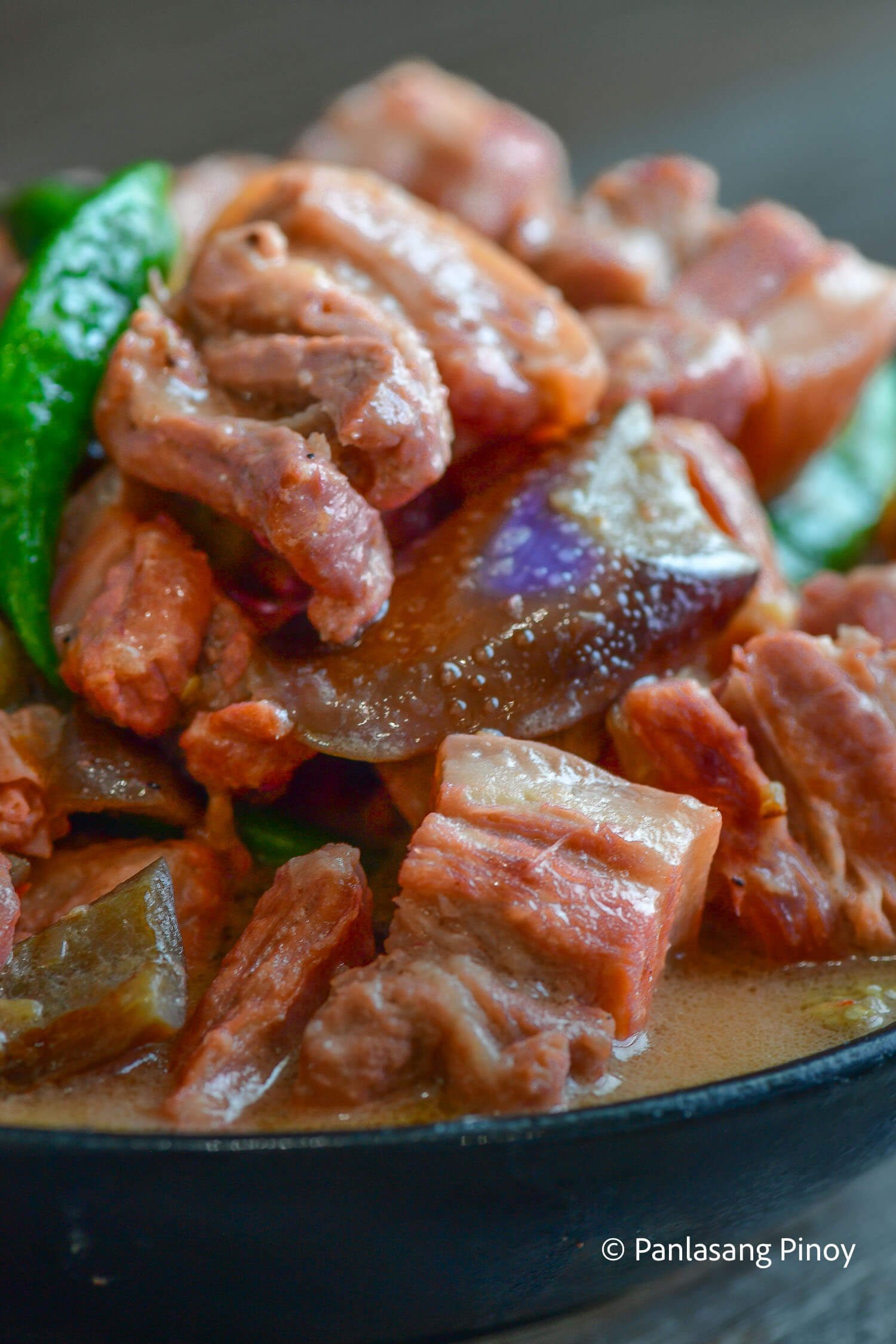
Did you make this? If you snap a photo, please be sure tag us on Instagram at @panlasangpinoy or hashtag #panlasangpinoy so we can see your creations!
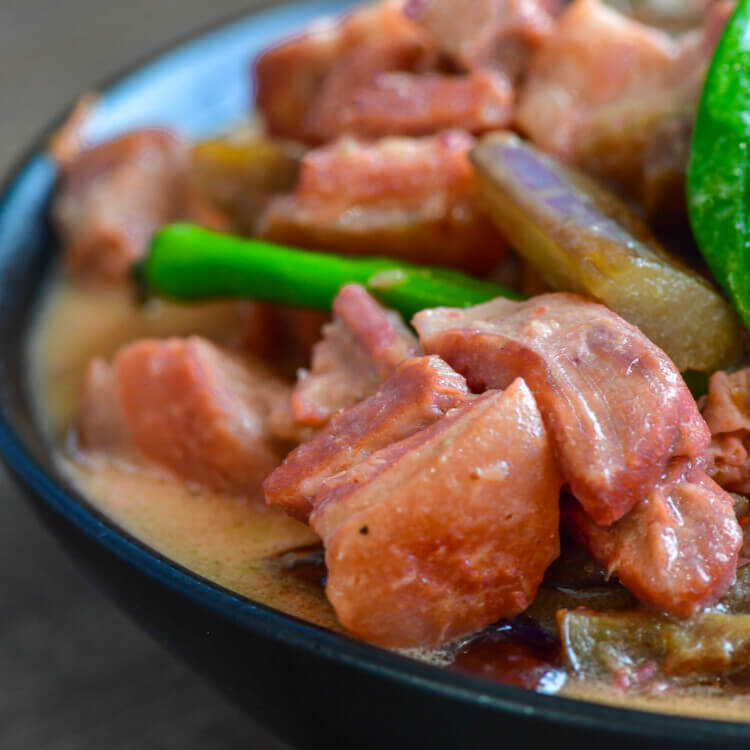
Pork Binagoongan sa Gata
Pork belly with shrimp paste in coconut milk
Instructions
-
Heat a pan and then sear the pork belly. Remove the belly from the pan and set it aside.
-
Add 2 tablespoons of cooking oil in the same pan. Fry the eggplants for 2 minutes per side. Remove and set aside.
-
Heat remaining oil in a pan. Sauté garlic, onion, and tomato. Add the shrimp paste (bagoong alamang) and cook it for 2 minutes.
-
Add the seared pork back once the onion softens. Cook for 1 minute.
-
Pour water and let the mixture boil. Adjust the heat to a low setting. Cook for 35 minutes.
-
Combine Knorr Gintaang Gulay Mix with 1 cup water. Pour the mixture into the pot. Add vinegar. Cover and continue cooking until the pork become tender.
-
Add the fried eggplants, long green peppers, along with a teaspoon of sugar. Cook for 2 minutes.
-
Season with fish sauce and ground black pepper. Serve with rice. Share and enjoy!
Video
Nutrition Information
Calories: 1365kcal (68%) Carbohydrates: 13g (4%) Protein: 31g (62%) Fat: 133g (205%) Saturated Fat: 45g (225%) Polyunsaturated Fat: 16g Monounsaturated Fat: 63g Trans Fat: 0.05g Cholesterol: 277mg (92%) Sodium: 436mg (18%) Potassium: 764mg (22%) Fiber: 6g (24%) Sugar: 5g (6%) Vitamin A: 325IU (7%) Vitamin C: 7mg (8%) Calcium: 179mg (18%) Iron: 5mg (28%)
